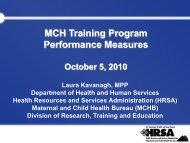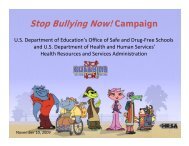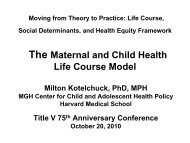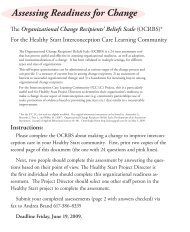2011 AMCHP and Family Voices National Conference ... - HRSA
2011 AMCHP and Family Voices National Conference ... - HRSA
2011 AMCHP and Family Voices National Conference ... - HRSA
You also want an ePaper? Increase the reach of your titles
YUMPU automatically turns print PDFs into web optimized ePapers that Google loves.
<strong>2011</strong> <strong>AMCHP</strong> <strong>and</strong> <strong>Family</strong> <strong>Voices</strong> <strong>National</strong> <strong>Conference</strong>: Welcome Plenary <strong>and</strong><br />
MacQueen Memorial Lecture<br />
02/13/<strong>2011</strong> Omni Shoreham, Washington, D.C.<br />
actually put together ten women, including myself, matched us up with 10<br />
high risk pregnant women <strong>and</strong> went about the business of trying to walk<br />
them through their pregnancies. Those of you who know my story know<br />
the woman I was matched up with, her baby actually died 10 days after he<br />
was born. But in his birth <strong>and</strong> his dying, he changed my life. His mother<br />
was actually discharged from care because she missed three prenatal visits<br />
in a row. And once I had my own clinic, I understood that your insurance<br />
will just eat you up if you have women who miss consecutive<br />
appointments. And so I began to see the other side of it. But in the<br />
beginning I did not underst<strong>and</strong> why a doctor would say to a high-risk<br />
pregnant woman you can't come back to my office because you have<br />
missed three consecutive appointments. And at the point that she missed<br />
the appointments, public health nurse called me <strong>and</strong> said I wonder if you<br />
would accept her into your program. And so I took her as my own little<br />
sister in the project. And my job was to get her reconnected back to care<br />
<strong>and</strong> when I did <strong>and</strong> the ultrasound was done it was at that point we<br />
realized her baby was really in distress. When baby was born, the baby<br />
had massive brain damage, which we later realized on the autopsy was<br />
because her diabetic medicine was having a negative interaction with the<br />
psychotropic drugs she was taking for something else. And so that was<br />
something that really could have been avoided. But it was not avoided<br />
because she didn't underst<strong>and</strong> her medical history <strong>and</strong> her medical records<br />
well enough to explain that to the doctor who asked her what drugs she<br />
was taking. But the part that was most impactful for me was during the 10<br />
days that the baby lived, he was on life support. And every day I went to<br />
look at him <strong>and</strong> just to be with him. And to be with the nurses <strong>and</strong> the<br />
doctors who were taking care of him. And what I realized was that there<br />
was a really big gap between the doctors <strong>and</strong> nurses who took care of him<br />
<strong>and</strong> their feelings about the fact that he was even born to a mother who



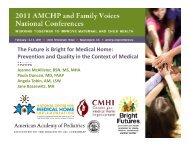
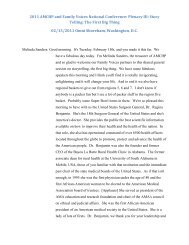
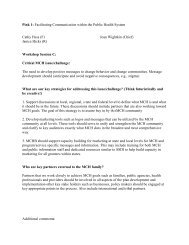

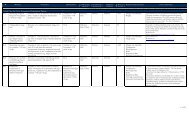
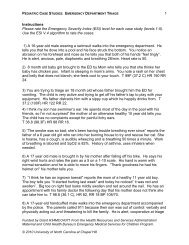
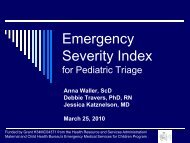
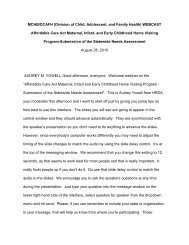
![Hormone Disruptors and Women's Health: Reasons for Concern [PDF]](https://img.yumpu.com/19410002/1/190x245/hormone-disruptors-and-womens-health-reasons-for-concern-pdf.jpg?quality=85)

